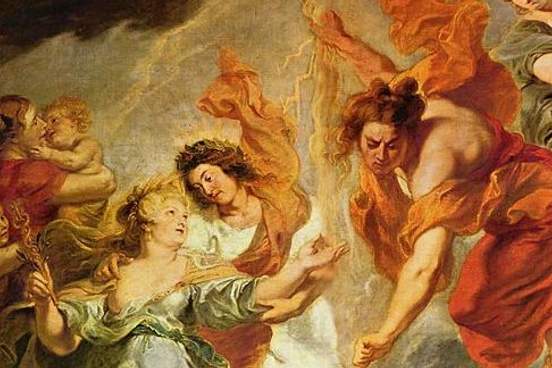
Doubting Thomas
Definition: an incredulous or habitually doubtful person
Doubting Thomas comes from the name of St. Thomas, the apostle who doubted the resurrection of Jesus. The name has been used to refer to an incredulous person for a number of centuries, dating back at least to the late 17th century. Thomas was not the only apostle to lend his name to an idiomatic term; Judas may be found in Judas goat, the name for an animal (often used figuratively) who leads other animals to a slaughterhouse or similarly unfortunate destination.
To make yet a doubting Thomas believe the existence of no Popry in this codicle, let him thrust his hand into the side and looke upon the Prints of these things, in the body of the Church Reformed, he shall, or may be ascertained of its Innocency….
— William Annand, Mysterium Pietatis, 1671

John Q. Public
Definition: 1. a member of the public or the community 2. the public or the community personified
No one knows what the Q in John Q Public actually means, due to the fact that the initial doesn’t really stand for anything. When the name began being used to refer to the collective public (in the early 20th century) we would occasionally find letters other than Q. stuck between the John and the Public.
John J. Public is singing a new song these prohibitory days.
— The Atlanta Constitution (Atlanta, GA), 25 Nov. 1925The belief that John G. Public is pretty well fed up with trick homers appears to be pretty general among the magnates, but some of course are expected to oppose any effort to change this rule.
— The Indiana Gazette (Indiana, PA), 18 Nov. 1930The S. E. C. has no power to correct this evasion of the Act unless it obtains positive proof of the facts. Thus John X Public does not get the “inside dope” anticipated when the law was written.
— The Palm Beach Post (West Palm Beach, FL), 20 Feb. 1935
What is currently our earliest evidence for the word contains no middle initial at all.
As usual, in all those European fights, it's old John Public who kicks in at the gate with the old two bits.
— The Washington Times (Washington, D.C), 7 Aug. 1914

Joe Six-Pack
Definition: an ordinary man; specifically: a blue-collar worker
Joe Six-Pack is one of the more recent additions to our stable of idiomatic words formed from first names, and is believed to have come from the stereotype of a six-pack of beer being the preferred libation of many blue-collar workers. Joe, much like John, is often used in conjunction with another word to designate a person of resoundingly average qualities: Joe Blow, Joe Bloggs, Joe Doakes, and Joe Schmo are just a few of the ways that our language has managed to insult those whose parents named them Joseph.
Coined by one of the area's livelier political informants, the picture is that of "Joe Six-Pack," a guy who works hard and wants to be left alone.
— Martin F. Nolan, The Boston Globe, 28 Aug. 1970

John Hancock
Definition: an autograph signature
John Hancock (1737-1793) was a governor of Massachusetts (twice), member of the Continental Congress, and signatory of the Declaration of Independence. It is for the last of these three roles that he is best remembered. His signature is dramatically large, dwarfing all the names surrounding it. It took a while to catch on, but by the late 19th century John Hancock was adopted as another word for signature.
Taking it for the gospel truth, the innocent seizes the pen and again writes his "John Hancock."
— Holmes County Republican (Millersburg, OH), 17 Nov. 1870

Typhoid Mary
Definition: one that is by force of circumstances a center from which something undesirable spreads
Typhoid Mary came into our language from the case of Mary Mallon, the asymptomatic carrier of the highly infectious disease typhoid. In the early 20th century Mallon was working in and around the New York City area as a cook, showing and experiencing no symptoms of typhoid herself, but infecting numerous others. She was twice placed in involuntary medical isolation (the second time for the remainder of her life). After she was initially found to have been responsible for a number of infections Mallon’s first name was combined with Typhoid, and used first to refer to actual typhoid carriers, and then took on a figurative meaning, in which it referred to one who spread any one of a number of undesirable things.
It used to be thought water was the principal source of typhoid; but now that “typhoid Marys” have been discovered, who, while themselves immune, shed typhoid germs as a southern oak sheds wood ticks, the peril is different.
— Norwich Morning Bulletin (Norwich, CT), 29 Jul. 1909

John Barleycorn
Definition: alcoholic liquor personified
John Barleycorn is one of our older idiomatic names, dating in use back to at least the early 17th century. We know this because some intrepid soul in the 1620s published a song with the exceptionally catchy title of A Pleasant New Ballad to Sing Both Even and Morne, of the Bloody Murther of Sir John Barley-corne (the criteria for what made a song title catchy were a bit different 400 years ago).
A temperate man.
Sir John Barly-corne is no body with him.
Be merry and wise.
A feast without wine.
More for bread than beere.
Enough's as good as a feast.
Lick hony with your little-finger.
A light supper keeps cleane sheets.
— John Clarke, Proverbs English and Latine, 1639

Sam Hill
Definition: a euphemistic expression of irritation or exasperation, often preceded by the or in
It is certain that there were people named Sam Hill before this name became a near synonym for tarnation, but it does not appear that any of these people were the cause of the name being adopted as a word in English. The explanation usually given for the etymology of sam hill is that it is a euphemism for hell.
…but when I walk on the deck, I see one sailor man have one wheel, which he turn round first au droit, to the right, and then turn him to the left, and I speak him, “Why for what you so moch labor always?”—and he say, “Sair, the dam ship steer like Sam Hill.” Well I not can understand, and then I go down in my chamber cabin, and I look in the dictionnaire of Johnson and Valker, and I not find Sam, but I ask the captain, and he laugh and say, “Sam one man’s name;” so I look and find Hill, one little mountain, but still I not understand what was Sam Hill.
— The Evening Post (New York, NY), 12 Feb. 1830

Nosy parker
Definition: busybody
Nosy parker (and its nosey variant) is chiefly found in British English, a dialect in which it originated in the late 19th century. We all likely know what the nosy portion refers to (it typically means "prying, inquisitive," although the word's original meaning was more literal, and simply referred to having a large nose), but where does parker come in? No one really knows; most etymologists guess that it was taken from some busybody's surname, either in literature or in real life.
”So I says to ‘im (you’ll understan’ as we had been a walkin’ out about four months, an’ I was gettin’a bit sick of ‘im an’ his ways), now, lookey ‘ere, Mr. Poll Pry, you’re a askin’ too many questions for me, there’s too much of Mr. Nosey Parker about you, an’ I’d ‘ave you to know as I’m a laidee, but perhaps you thought as I was a J. an’ yer could ‘ave me on a bit of toast, but you’re mistaken, and so yer ‘ad better sling yer ‘ook.”
— E. Hess-Kaye, Belgravia (London, UK), May 1890

Nervous Nellie
Definition - a timid or worrisome person
We are not entirely certain how nervous Nellie came to describe a timid person. One theory is that it was employing an archaic term for “horse.” However, all of the earliest uses of the expression are in reference to Frank B. Kellogg, a former Secretary of State, ambassador to England, and senator from Minnesota. Kellogg was many things, but he was not, so far as we can tell, a horse. It must be said that he also had no Nellie in his name, so it remains unclear why he should have been the first to have this insult directed his way, but such is the way of English.
And now the man named is “Nervous Nellie” Kellogg, noted for his legal learning and ability, his extreme caution and his amiable disposition.
— The Evening Sun (Baltimore, MD), 27 Oct. 1923

Hail Mary
Definition - (American football) a long forward pass thrown into or near the end zone in a last-ditch effort to score as time runs out
The Hail Mary (which is pluralized Hail Marys) did not originate as a football term. The original sense, in use since the 14th century, is defined as “a Roman Catholic prayer to the Virgin Mary that consists of salutations and a plea for her intercession.” The non-religious use did not originate until the 20th century, and although occasional quarterbacks have claimed credit for coining the term no one knows for certain who first used it when throwing a football. The Hail Mary is also used figuratively, and in non-football senses, to refer to a long shot of any kind.
A “Hail Mary” pass, in the talk of the Washington eleven, is one that is thrown with a prayer because the odds against completion are big.
—Tampa Bay Times (St. Petersburg, FL), 31 Dec. 1940Then on fourth down they threw a ‘Hail Mary’ pass (long, arching pass) and darned if they didn’t score a touchdown on it to tie us.
—Philadelphia Daily News, 21 Oct. 1961

Peeping Tom
Definition - a pruriently prying person
Lady Godiva was an 11th century English noblewoman, married to a fellow named Leofric. According to legend, she continually asked her husband to lower taxes on the locals, enough so that Leofric finally said that he would, given that she would ride through the town completely naked. Various versions of the story have differing forms and endings (in some the townspeople stay indoors while she rides by, and in others they simply close their eyes); in the 17th century a new plot twist was introduced in the form of a single townsman who did not avert his eyes. This was, of course, a fellow named Tom, and from his ogling of the Lady Godiva we get peeping Tom.
The cunning Earl, by the Proposal, thought to silence the nimble Tongue of his Lady; but she complied; and. consulting with the Citizens, a strict Order was given, that not a single Eye should peep abroad from the Hour of Twelve to One, upon severe Pains and Penalties, which was exactly observed by all the Inhabitants, but this Rogue Peeping Tom.
— William Rufus, A Tour Through Ireland, 1746

John Bull
Definition - 1. the English nation personified; the English people 2. a typical Englishman
John Bull came into the language of the people who it ostensibly personifies in the beginning of the 18th century. The term was the name of a character (meant to typify the English nation) in John Arbuthnot’s 1712 work The History of John Bull. The word quickly became assimilated into our vocabulary, and sprouted a number of variants, including the nouns John Bullishness and John Bullism, and the adjective John Bullish.
The English, he contends, are naturally brutes. “Dogged incivility, stolid John Bullishness, the affectation of vulgar minds and vulgar men,” are their characteristics.
— Freeman’s Journal (Dublin, Ir.), 16 May 1843

Tom o'Bedlam
Definition - a wandering mendicant either mad or feigning to be so; bedlamite
Tom o’Bedlam, which was initially written as Tom of Bedlam when it first appeared in the 16th century, may seem to be a word which is unlikely to have a synonym. However, the English language is large enough to have room for at least two words meaning “beggar who pretends to be mad,” for in addition to Tom o’Bedlam we have Abraham-man (“one of a class of beggars who roamed through England especially in the 16th and 17th centuries usually feigning lunacy to obtain alms”). The Bedlam portion of this word comes from the popular name for the Hospital of St. Mary of Bethlehem, London, an asylum for the mentally ill.
The Caniball swears Mummie's Bacon: he differs from an ordinary Tom of Bedlam, as a wild Wolfe from a tame one, or Rome on fire from Neroes Fiddle.
— John Cleveland, Midsummer-moone, 1648

Jane Doe
Definition - a woman who is a party to legal proceedings and whose true name is unknown or withheld
We’ve been referring to anonymous women in legal proceedings as Jane Doe for over three hundred years now; our earliest records of such use come in 1700. The masculine correlate, John Doe, is slightly older, in use since the middle of the 17th century. Jane Doe typically is only used in legal settings; John Doe is defined both as “a party to legal proceedings whose true name is unknown,” and as “an average man.”
It's said in 2 Keb. 712. the Defendant avows by Devise of Rent to Jane Doe, who marries: Judgment was for the Avowant, notwithstanding the Avowry be in jure uxoris, and the wife no Party.
—Anon., A treatise of the common law concerning husbands and wives, 1700

Jack Frost
Definition - frost or frosty weather personified
In Middle English Jacke was a nickname for Johan (or John), and also a familiar term of address to a social inferior. It no longer is used in this manner, so please do not use this information to tease all the people you know named Jack. This name may be found in a wide variety of idioms, from jack of all trades, jack-a-dandy, and Jack Frost. This term for the personification of nippy weather has been in use since the early 18th century.
But as one goes out in the street, and feels old “Jack Frost” nipping at his face and fingers, and in the course of his peregrination passes by the fur store of Mr. John Fareira, at No. 718 Arch street, his doubts all vanish, and he sees at once what would be the most acceptable.
— The Evening Telegraph (Philadelphia, PA), 21 Dec. 1866

Pop Quiz
Time to test your new-found knowledge of eponyms!
TAKE THE QUIZ >





